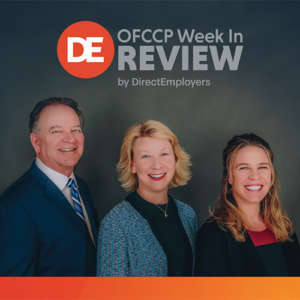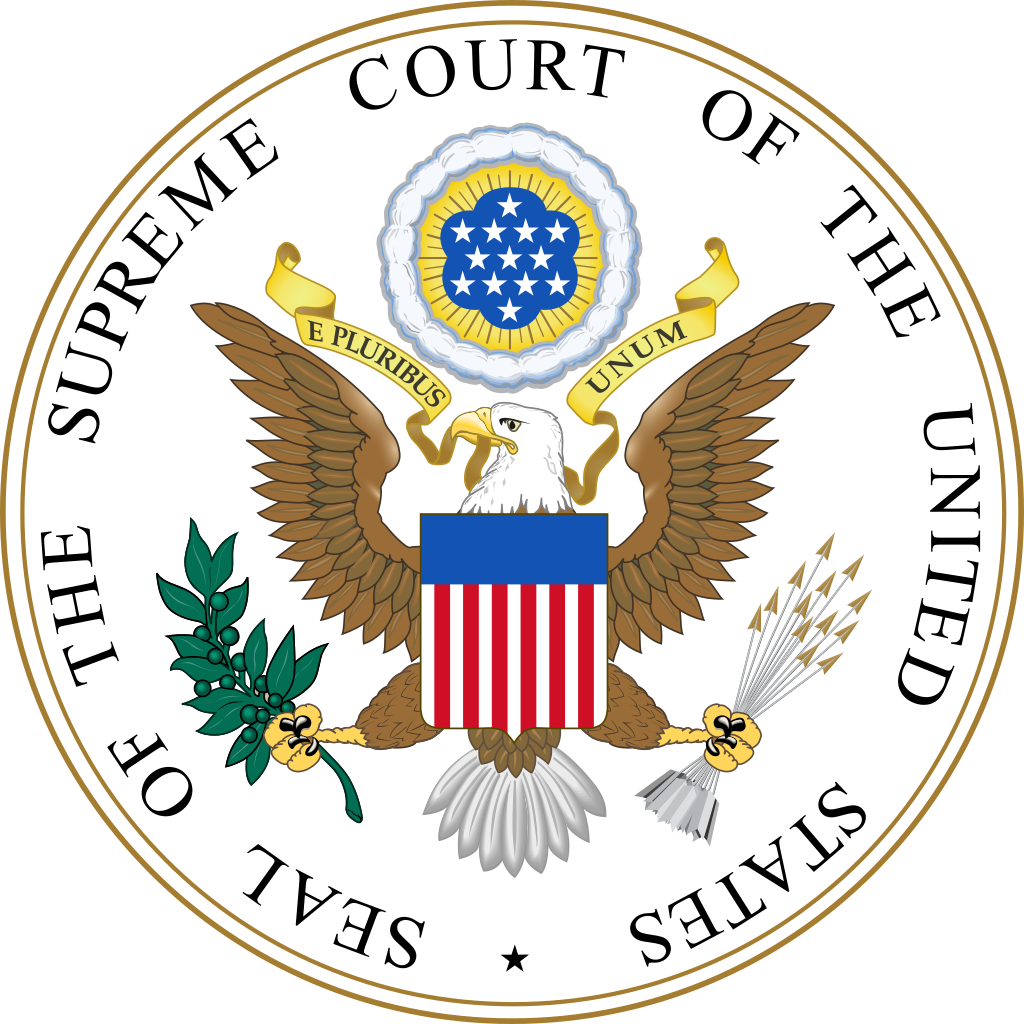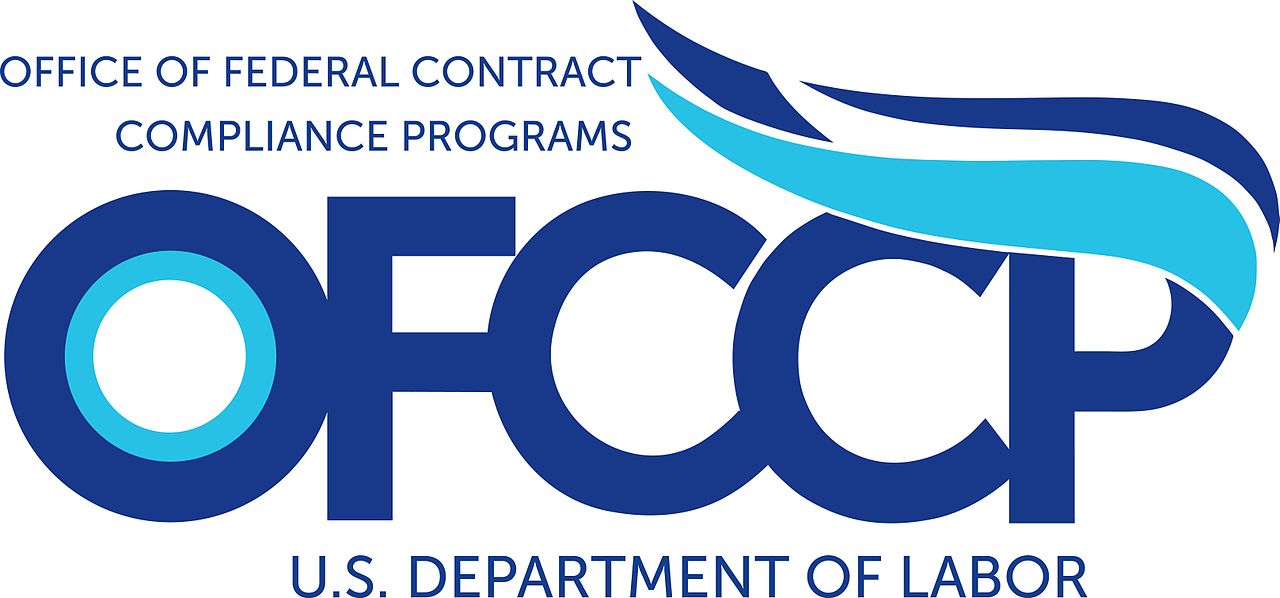 The DE OFCCP Week in Review (WIR) is a simple, fast and direct summary of relevant happenings in the OFCCP regulatory environment, authored by experts John C. Fox, Candee Chambers and Jennifer Polcer. In today’s edition, they discuss:
The DE OFCCP Week in Review (WIR) is a simple, fast and direct summary of relevant happenings in the OFCCP regulatory environment, authored by experts John C. Fox, Candee Chambers and Jennifer Polcer. In today’s edition, they discuss:
- Supreme Court Declines to Weigh-In on ADA and Mobile Accessibility at This Time
- SCOTUS Heard Oral Arguments on LGBTQ Cases
- EEOC & OMB ask the Court to End the Component 2 Data Collection by November 11, 2019
- Director Leen Kicks off NELI
- NELI Part III – Reasonable Accommodations & Other Hot Topics
- OFCCP Released TAG for Educational Institutions
- Legal Counsel Sworn into EEOC
Monday, October 7, 2019: Supreme Court Declines to Weigh-In on ADA and Mobile Accessibility at This Time

The federal Courts thus remain split over the legal issue whether Title III of the ADA applies to websites. Currently, there are no regulations clarifying companies’ online accessibility obligations under Title III of the ADA.
The Case – Complaint
The Plaintiff contends:
- The website, Dominos.com, allegedly does not permit a user to complete purchases using the screen-reading software program JAWS (Job Access with Speech). JAWS is a prevalent browser for blind individuals and those with vision impairments;
- The Mobile App allegedly does not permit access to the menus and applications on an iPhone using the iPhone’s “Voice Over” software program;
- According to Mr. Robles’ Complaint in the federal District Court, neither Dominos.com nor the Mobile App complies with version 2.0 of W3C’s Web Content Accessibility Guidelines (WCAG 2.0);
- Robles contends that “simple compliance with the WCAG 2.0 Guidelines would provide [the] Plaintiff and other visually-impaired consumers with equal access” to these access portals.
The Case – Defense
The Defendant contends:
- That neither Dominos.com nor the Mobile App are “places of public accommodation” within the meaning of the ADA;
- That the instant lawsuit violates fundamental principles of due process because the ADA, its implementing regulations, and the DOJ’s accessibility guidelines not only are silent with respect to the standards that apply to private and public websites but also fail to indicate whether compliance with the WCAG or the Apple Standards is tantamount to compliance with the statute. Note: THE WCA Guidelines are not government Rules or even government-sponsored. Rather, the Guidelines are the product of a well-respected international consortium of private professionals dedicated to writing Internet code protocols for common understanding on the World Wide Web
- That the Plaintiff cannot establish violations of any applicable accessibility standards;
- That the Plaintiff cannot prove that Defendant intentionally discriminated against him; therefore the Plaintiff’s California state law claims under UCRA (Unruh Civil Rights Act) should be denied;
- That the Plaintiff’s UCRA claims also fail because Defendant lacked fair notice of the barriers Plaintiff claims exist;
- The Plaintiff’s claims should be stayed because the Department of Justice has not promulgated any accessibility regulations governing the website or mobile applications of private businesses.
The Verdict(s)
The U.S. District Court for the Central District of California dismissed the Case on the notion that Title III of the ADA does not specify the expectations of website compliance and that further “technical assistance is needed.” In conclusion, the Court called on “Congress, the Attorney General, and the Department of Justice to take action to set minimum web accessibility standards for the benefit of the disabled community, those subject to Title III, and the judiciary.”
The Plaintiff appealed.
In January 2019, the U.S. Court of Appeals for the Ninth Circuit reversed and remanded the Case. Specifically, the Ninth Circuit expressed “no opinion about whether Domino’s website or app comply with the ADA. We leave it to the district court, after discovery, to decide in the first instance whether Domino’s website and app provide the blind with effective communication and full and equal enjoyment of its products and services as the ADA mandates.”
The Bottom Line
The Case is potentially instructive to federal Government contractors subject to Section 503 of the Rehabilitation Act, as amended, since if cyberspace is a “place” covered by Title III, it is likely also a “place” within the meaning of Section 503 of the Rehabilitation Act (following the ADA Amendments Act which homogenized the substantive law of both statutes). Section 503, of course, requires contractors to accommodate job seekers, including blind and vision-impaired job seekers who seek to apply online.
Employers may wish to holistically review the accessibility of their entire websites, not just customer-facing portals or employment-facing portals.
Need Help?
- Career Website Accessibility – contact Recruit Rooster
- Reasonable Accommodations – Job Accommodation Network (JAN)
Tuesday, October 8, 2019: SCOTUS Heard Oral Arguments on LGBTQ Cases

Although half of the states have passed statutes specifically identifying sexual orientation and gender identity as protected classes, the remaining half have not. As evident in the arguments, the question draws uncertainty on both sides, for a variety of reasons.
The Legal Landscape in 1964
Justice Ruth Bader Ginsburg, “…how do you answer the argument that back in 1964, this [sexual orientation] could not have been in Congress’s mind because in — in many states male same-sex relations was a criminal offense; the American Psychiatric Association labeled homosexuality a mental illness?”
Is this a judicial decision or a legislative decision?
Justice Samuel Alito pointed out that people will say, “that whether Title VII should prohibit discrimination on the basis of sexual orientation is a big policy issue, and it is a different policy issue from the one that Congress thought it was addressing in 1964. And Congress has been asked repeatedly in the years since 1964 to address this question. The Equality Act is before Congress right now. Congress has declined or failed to act on these requests. And if the Court takes this up and interprets this 1964 statute to prohibit discrimination based on sexual orientation, we will be acting exactly like a legislature. We might as well just take the Equality Act and issue that as our opinion and say, as Judge Posner said, that the courts need to intervene on questions like this when the legislative branch simply will not do so.”
So, what’s next?
We wait. All opinions of SCOTUS, typically, are handed down by the last day of the Court’s term (the day in late June/early July when the Court recesses for the summer). Except for this deadline, there are no rules concerning when decisions must be released. Typically, unanimous decisions are released sooner than those that have concurring and dissenting opinions. While some unanimous decisions are handed down as early as December, some controversial opinions, even if heard in October, may not be handed down until the last day of the term.
Full Details
- Oral argument number one (Bostock v. Clayton County – sexual orientation)
- Oral argument number two (G. & G.R. Harris Funeral Homes, Inc. v. EEOC – transgender)
- See our summary recap of the three cases and how the District Courts have decided thus far.
Tuesday, October 8, 2019: EEOC & OMB ask the Court to End the Component 2 Data Collection by November 11, 2019

The EEOC and the Office of Management and Budget (OMB) asked Judge Tanya Chutkan of the federal District Court for the District of Columbia to allow the EEOC to deem “complete” and end its EEO-1 Survey Component 2 data collection (of “hours worked” and “pay data”) not later than November 11, 2019. The agencies also wish to receive that Order by November 1, 2019. The EEOC wants an early determination to avoid signing further contract extensions with its Component 2 collection vendor amounting to $150,000 per week for collections continuing after November 11, 2019.
In its “…MOTION FOR ORDER DETERMINING COMPLETION OF COMPONENT 2 DATA COLLECTION”, the agencies argued that they had now satisfied the Court’s April 23, 2019 Order in the case of National Women’s Law Center (“NWLC”) v. OMB and EEOC. That Order had required the EEOC to undertake three primary actions to:
- “Immediately take all steps necessary to complete the EEO-1 Component 2 data collections for calendar years 2017 and 2018 by September 30, 2019;”
- “Issue a statement directing employers to submit the required data by that date;”
- Every 21 days after the Court’s Order, “provide reports to Plaintiffs and the court of all steps taken to implement the EEO-1 Component 2 data collections since the prior report,” as well as “all steps to be taken during the ensuing three-week period,” and must indicate “whether EEOC is on track to complete the collection(s) by September 30, 2019.”
The Court also ordered that the “data collection(s) will not be deemed complete, for the purpose of this [April 25, 2019] Order, until the percentage of EEO-1 reporters that have submitted their required EEO-1 Component 2 reports equals or exceeds the mean percentage of EEO-1 reporters that actually submitted EEO-1 reports in each of the past four reporting years.”
In its Motion to end the Component 2 data collection, the EEOC and OMB reported to the Court that:
“[A]s of September 30, 2019, 71.3% of eligible filers had submitted Component 2 data.
*** As of October 8, 2019, 75.9% of eligible filers had submitted Component 2 data.
*** This includes 76.2% of filers submitting Component 2 data for calendar year 2017, and 75.6% of filers submitting Component 2 data for calendar year 2018.”
The EEOC then further argued that:
“Moreover, the 72.7% rate…is essentially consistent with the response rate for similar surveys, according to contemporary social science research. *** While the final response rates for the prior EEO-1 Component 1 collections eventually exceeded 90.0%, those rates do not inform the response rate for the 77-day collection period for Component 2 data at issue here; as the agency explained, the final response rates for the 2014, 2016, and 2017 collections are attributable to the EEOC’s continued acceptance of data “from late filers long after the data collection deadlines passed. *** In certain instances, those collections remained open for nearly a year after the closing date. *** Leaving data collections open for months after the filing deadline undermines the quality and utility of the data; the EEOC has ended this practice, and its current practice is to keep the EEO-1 collection open only for a six-week period after the filing deadline.”
Finally, the EEOC reported to the Court that: “Consistent with its current practice regarding Component 1 data, the EEOC will continue to collect Component 2 data for a six-week period after September 30, 2019. The agency is incurring contract-related costs as the collection remains open. *** These costs include approximately $1.5 million to continue collecting Component 2 data in the six-week period following September 30, 2019. *** Any further collection beyond this six-week period would require the EEOC to incur additional contract costs of approximately $150,000 per week.”
The agencies also reported that the Plaintiffs (NWLC) have informed the agencies that they oppose their Motion to deem the Component 2 collection complete. The NWLC will thus soon file its Opposition, after which the agencies will have a right to Reply. Expect a fight over what “complete” means within the meaning of the Court’s April 25, 2019 Order and whether the EEOC has to continue to hold open the Component 2 collection portal to collect up to 90% of all Component 2 filings from employers eligible to file.
Tuesday, October 8, 2019: Director Leen Kicks off NELI

Part I: A few critical take-a-ways from Director Leen:
- The Religious Exemption Rule does not/would not give companies the ability to discriminate based on gender identity. Specifically:
Fox: “If a transgender applicant was rejected clearly [for the sake of argument] because of their transgender status…by a small, closely-held family corporation who [had a] sincerely held religious belief that does not embrace transgender status, will you take that compliant it?”
Leen: “Yes.”Leen: “If you are discriminating against that person based on their gender identity, the religious exemption would not protect you now or even after this rule, if it were to be adopted.”
- OFCCP’s goal to get aged (over two years) case-load down. In some regions, it was up to 50%! The goal is to bring to resolution, one way or another, all audits four or more years old BY OCTOBER 31, 2019. The goal for Fiscal Year 2020 (began October 1, 2019) is to bring to a conclusion all audits three or more years of age.
- OFCCP does not view the EEO-1 Component 2 data (“hours worked” and “pay data”) as useful. The data are too general. OFCCP will not seek to collect Component 2 data, thus joining the EEOC’s recent pronouncement that it will not seek new authority to collect Component 2 data beyond the current collection cycle for 2017 and 2018 data.
- OFCCP’s goal is to eventually schedule and close 3500 Compliance Evaluations (“audits” or various types) per Fiscal Year (FY). Expect OFCCP to announce (around Veterans Day (November 2019)) audit authority to conduct 500 Protected Veteran Focused Review audits in FY 2020. OFCCP then hopes to issue a new CSAL (Corporate Scheduling Announcement List) in the spring of 2020, containing on the listing 3500 establishments for various kinds of audits, including new Promotion Focused Reviews.
- The Office of Management and Budget has not yet approved the pending new audit Scheduling Letters for Section 503 Focused Reviews, but OFCCP expects that authority any day soon now.
- Marcus Stergio, OFCCP’s new Ombudsman, expects to issue a detailed manual (by year-end) setting out the Rules of Engagement to involve his Office in disputes with the OFCCP.
- Revised Federal Contract Compliance Manual (FCCM)to come by year-end.
- Ten town halls to come this Fiscal Year.
- Goal of ten Opinion Letters a year.
- AAP verification portal – more information may come out “any day.”
- The Solicitor’s Office (OFCCP’s lawyers) have provided Director Leen with formal guidance that military spouses are protected under VEVRAA…however, a word search for “spouse” draws a blank in 38 U.S. Code 4212. OFCCP fails to identify a military spouse as a protected class in its infographic or in its description of “Who can file a complaint under VEVRAA?” Director Leen stated that OFCCP would intake a Complaint from a military spouse if the spouse complained that a Government Contractor had denied him/her a job because s/he was a military spouse with a likely potential short term employment runway before his/her active duty spouse were again transferred. Note: This is not to say contractors should not work to employ military spouses. This is a high potential and often overlooked demographic.
NELI’s session continued to cover:
Part 2 – A discussion by Ken Bello, Esq. and Martha Zackin, Esq. on the OFCCP v. Analogic Corp. case decision and lessons learned for compensation discrimination law. Ken first chaired the Analogic case at trial supported by his law firm and prevailed after a vitriolic trial. As a result, OFCCP has found the need to reform its investigation procedures of federal government contractor compensation practices and systems.
A few critical take-a-ways from Mr. Bello:
- It’s OK to have exceptions to a salary cap; however, be sure to have a clear paper trail outlining the situation.
- There is value in explaining to employees the company’s compensation system (on some level).
- Push back hard against OFCCP if it refuses to release anecdotal evidence; statistics alone do not make a case. (Craig Leen had stated earlier in the day during Webinar I that OFCCP would reveal anecdotal evidence to contractors to help convince the contractors of the problematic position the contractor faces, if they do).
- Ensure any outliers (in pay rate) have a clear paper trail explaining why they are outliers.
- If there is a written complaint, there should be a written course of follow-up.
- The Administrative Law Judge in the Analogic case held that OFCCP’s failure to analyze the specific steps in Analogic’s compensation process, as opposed to the ENTIRE compensation process as a whole, was a fatal analysis architecture and invalidated OFCCP’s “Adverse Impact” case against Analogic.
- The Administrative Law Judge in the Analogic case held that OFCCP’s failure or refusal to analyze all the major factors which affected pay was fatal to OFCCP’s Disparity Analyses attempting to prove intentional discrimination based on sex and that such incomplete analyses could not prove unlawful discrimination.
Thursday, October 10, 2019: NELI Part III – Reasonable Accommodations & Other Hot Topics

Candee Chambers finished off Webinar III relating Mr. Fram’s discussion of reasonable accommodation to the coming OFCCP Section 503 Focused reviews. Highlights included that:
- While OFCCP is still deciding the length of time it will spend on-site during Section 503 Focused reviews; it will likely end up being between two and five days on-site, depending on what OFCCP finds. What is clear is that all Section 503 Focused Reviews (and the coming Protected Veteran Focused reviews) will entail on-site investigations of Corporate headquarters or large regional offices.
- Corporate “systems” for accommodation, training, compensation of individuals with disabilities, recruitment and outreach, and accessibility to jobs information will be the focus of the Focused Reviews.
- OFCCP will be discussing numerous “Best Practices” with the contractor. Craig Leen hopes that every contractor will have a centralized accommodation process led by a manager to drive accommodations.
- Remember, in any type of evaluation, but assuredly in a Section 503 Focused Review, the OFCCP will apply for a job on your website and request an accommodation, so make sure your processes are in place and responsive to anyone needing assistance.
Candee Chambers and John Fox concluded the conference with a discussion of OFCCP “HOT TOPICS,” including:
- Changing audit selection methodologies;
- Proper defense of failure-to-hire investigations;
- The use of “non-binary” reporting systems for gender;
- What contractors must and should do when OFCCP receives FOIA requests for a contractor’s documents, including compensation data;
- How OFCCP’s evolving use of Pre-Determination Notices are trumping and diminishing the importance of Notices of Violation and Show Cause Notices;
- A discussion of the provocative and unexpected answers to some of the 25 Survey Questions John Fox asked of the National Industrial Liaison Group annual conference attendees in Milwaukee in July and what it means for the future of OFCCP’s development of its discrimination law investigations and audit techniques; and
- How OFCCP Compliance Officers are still struggling with the difference between job “listings” (required by OFCCP’s VEVRAA Rules) and job “postings” (essential for recruitment but not something OFCCP requires) as reported by DirectEmployers Members with increasing frequency in recent months.
Important Take-a-way
There is NO requirement for federal contractors to post their jobs!!! The requirement, under VEVRAA ONLY, is to “list” positions with the ESDS (American Job Center Finders) to accomplish a “Priority Referral” within the Career One-Stops, which VEVRAA mandates for Protected Veterans.
Note on the Affirmative Action Workshop
NOTE 1: For those who missed the NELI Webinar Conference and its information-packed 2-hour discussion with Craig Leen, you may contact the National Employment Law Institute to receive the materials and rebroadcasts of all four Webinars. DE Members receive a 30% discount on this NELI Webinar Conference: The annual Affirmative Action Update.
NOTE 2: John Fox announced that NELI will no longer offer his usual one-day pre-conference workshop outlining how to develop compliant Affirmative Action Programs in a live ballroom format. Instead, NELI and the DE Academy are working together at this time to convert this one-day program to a 10-hour, 17 segment on demand video format. NELI and DE will later this year make the new video format available to the public. Stay tuned!
Friday, October 11, 2019: OFCCP Released TAG for Educational Institutions

Some of the items reviewed in the TAG include:
- Overview of Affirmative Action Programs;
- What to expect during a compliance Evaluation;
- Specialty Areas (Athletics, Medical, Online Institutions);
- Sample Organizational Files;
- Assistance in determining availability;
- How to conduct adverse impact analysis.
NOTE: John Fox is writing a BLOG for release later this week about the several surprising substantive positions OFCCP has announced in this seemingly technical document.
Friday, October 11, 2019: Legal Counsel Sworn into EEOC

THIS COLUMN IS MEANT TO ASSIST IN A GENERAL UNDERSTANDING OF THE CURRENT LAW AND PRACTICE RELATING TO OFCCP. IT IS NOT TO BE REGARDED AS LEGAL ADVICE. COMPANIES OR INDIVIDUALS WITH PARTICULAR QUESTIONS SHOULD SEEK ADVICE OF COUNSEL.
SUBSCRIBE.
Compliance Alerts
Compliance Tips
Week In Review (WIR)
Subscribe to receive alerts, news and updates on all things related to OFCCP compliance as it applies to federal contractors.
OFCCP Compliance Text Alerts
Get OFCCP compliance alerts on your cell phone. Text the word compliance to 55678 and confirm your subscription. Provider message and data rates may apply.
